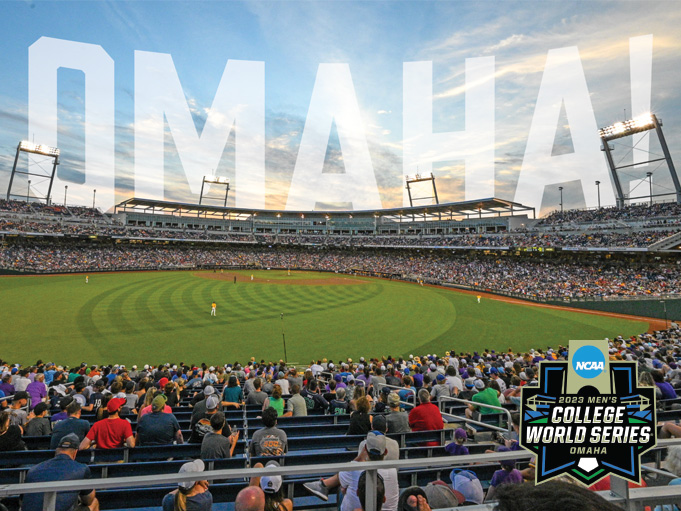A stadium in Nebraska is the field of dreams for college umpires.
It’s 10:15 a.m. on a mid-June Sunday and George Drouches has already put in a full day’s work, as evidenced by the notepads, backpacks, telephones, three-ring binders and other items scattered around room 403 of the Fairfield Inn & Suites in downtown Omaha, Neb.
It’s the opening weekend of the 2023 Division I Men’s College World Series. Only four games have been played in what will ultimately shake out to be a 16-game event spread out over 11 days. The demands on the NCAA’s national coordinator of baseball umpiring have never been greater.
“This is a mental toughness event,” concedes Drouches before offering perhaps the most honest appraisal of what has been happening and will continue to occur for the eight men selected to umpire this year’s “Greatest Show on Dirt.”
“Day One, it’s exciting. Day Five, you’re tired. Day 10, you want to call Mom. Day 12, you want to die.”
And on Day 13, every one of them will have one thought: How do I get back here again next year?
The Place to Be
Why the 40th biggest city in the country, known for steaks, billionaire Warren Buffett and a great zoo? As a T-shirt hung in a downtown boutique reads, “Omaha: For some reason, you have to come here to win a baseball championship.”
You also have to come to Charles Schwab Field if you want to umpire one. You need to have an unwavering belief you are among the eight best among a field of hundreds of peers vying for the very same honor.
However, unlike the teams competing to get here, the umpires’ Omaha quest does not begin with a clean slate in February. While the NCAA umpiring roster lists approximately 675 arbiters registered to work at its highest level, only about one-fifth enter any new season harboring any real hopes of scoring one of the 96 postseason invitations released each May. And getting onto that watch list is anything but a “What have you done for me lately?” endeavor. It’s a journey several years in the making.
It involves impressing a conference coordinator (or perhaps more than one) and finding your way to the top of the list that assigner submits to the NCAA for postseason consideration. Along the way, one of four NCAA national umpiring advisors — Mark Ditsworth, Jim Jackson, Bob LaBelle and Bill McCallum — has undoubtedly stopped in on several of your games and watched you work. So has Drouches; or Randy Bruns, the NCAA secretary-rules editor; or Billy Haze, the NCAA director of umpire training.
“They submit well over a thousand observation reports,” said Drouches about the combined efforts of the evaluation team. “That gives us a lot of landscape. We’re out every weekend. We’re actually looking at the guys. We have eyes on the process.”
That process leads to a mid-May meeting in Indianapolis where Drouches, the national umpiring advisors and the NCAA staff select 96 Regional umpires, 32 Super Regional umpires and the eight people who will have their lives changed forever when they answer their phones and hear they’ve been invited to Omaha.
No selection criteria has been etched in stone. Some years, the chosen eight have a wealth of pro umpiring experience accrued before they moved into the collegiate ranks. Other years, those who are strictly amateurs carry the water. Geography is not a factor. The desire to bring at least a few fresh faces to Omaha each June is very real, but no mandate has been leveled that the crew makeup include a certain percentage of rookies or MCWS veterans.
“We changed the dynamic of the selection process a few years ago,” Drouches said, without revealing any specific trade secrets. “Umpire competition is at an all-time high. We’re looking to give lots of umpires lots of opportunities.
“The final analysis is the committee has directed me to bring the best guys to Omaha. And, ultimately, can they handle Omaha? It’s not easy.”
Prepped and Ready
So it was on June 14, the eight men chosen to work this year’s MCWS gathered in the lobby of that same Fairfield property that housed Drouches’ war room. A little more than 25 hours remained before the first pitch would be thrown in the 2023 event.
There are people on hand in the bowels of Charles Schwab Field sharing advice about the need to treat each ballgame in Omaha like it’s just another game. After all, there is a reason these eight men were selected for the sport’s premier showcase. It had to do with their ability to turn in professional, competent efforts. So if it ain’t broke, why fix it?
Then again, there are also people mingling about doing everything they can to demonstrate each game is very much not just another game. Ask any college umpire to list pet peeves, and near the top will be the lack of a locker room that offers security and sanctuary. Umpires want a place where they can talk among themselves both pregame and postgame, share stories that may not be fit for public consumption and perhaps enjoy a bite to eat and a warm shower without having to worry about a wayward assistant wrestling coach traipsing through the “secure” locker room and absolutely killing the vibe.
Now, make no mistake, the accommodations at the MCWS site are top notch. A large umpires room awaits the 2023 umpires as they arrive with 50-pound gear bags in tow. Drouches has initially split the eight umpires into two crews of four, each with a dedicated crew chief, and each four-man crew has a private locker room off the main room in which to set up shop. Crew chief Jeff Head and compatriots Ramon Armendariz, Angel Campos and Brandon Cooper take the room to the right, while crew chief Billy Van Raaphorst and partners Casey Moser, Travis Reininger and David Savage veer to the left. Name placards are installed above each umpire’s locker, and out come all the accoutrements — new MCWS hats and shirts, crisply pressed pants and freshly polished plate shoes, and each umpire’s personal effects that will help allow this home for the next 12 days to feel like, well, home.
Meanwhile, the main locker room looks like a cross between a Fortune 500 board room, the Dunder-Mifflin break room and a Best Buy showroom. Drouches sits at the head of the long table in the center of the room, a massive, back-breaking three-ring binder containing papers pertaining to every possible MCWS umpire contingency constantly within arm’s length. The umpiring crew gathers around the table for the first of several meetings on the day while Larry, the umpire “clubby,” works first on getting the air conditioning to function properly now that the once-empty room is extremely populated, before shifting his attention to the need for stocking the nearby refrigerator with bottles of water and Powerade. A bit later, cold cuts and loaves of bread appear on the counter, and out come the requests for specific umpire provisions, with a special emphasis on the one food group that makes every good umpire function: PB and J.
The television in the main room and everyone’s personal cell phone is off while Drouches holds his charges’ rapt attention, but that doesn’t mean electronics aren’t omnipresent. Various ESPN contractors parade through the quarters, running cable and wires to and fro. One of the most frequent interlopers is Patrick, who is responsible for jerry-rigging a small camera onto the mask of the plate umpire before every game to create the suddenly en vogue “MaskCam” that makes its way into every ESPN broadcast. At the same time, the employees of DVSport, the Pittsburgh-based company that provides video review support, are shuttling into a back room that features a bank of monitors that will carry live feeds from every camera in the ballpark.
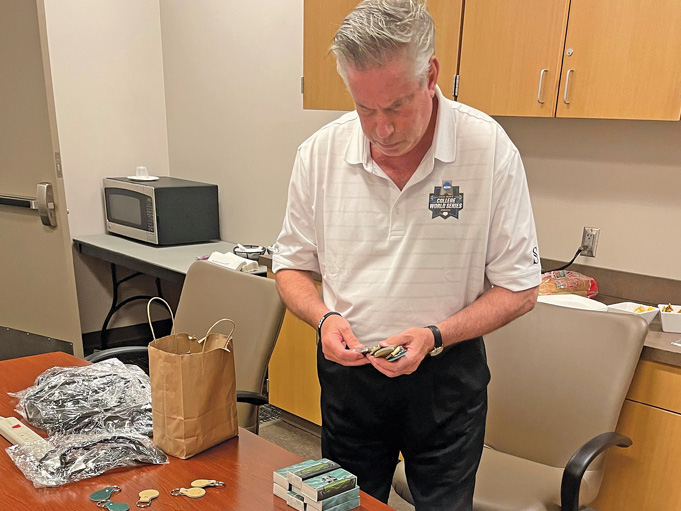
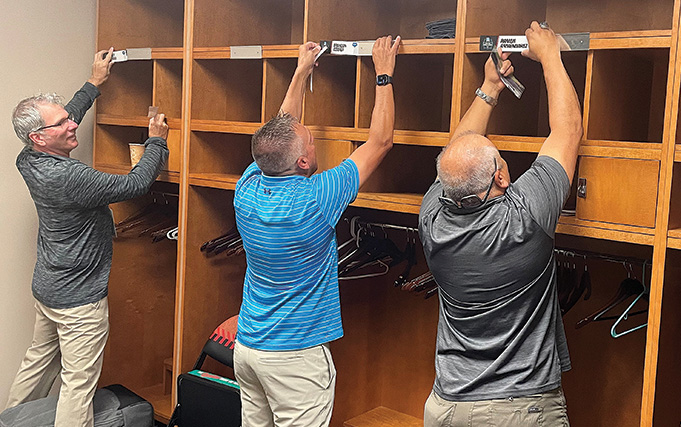
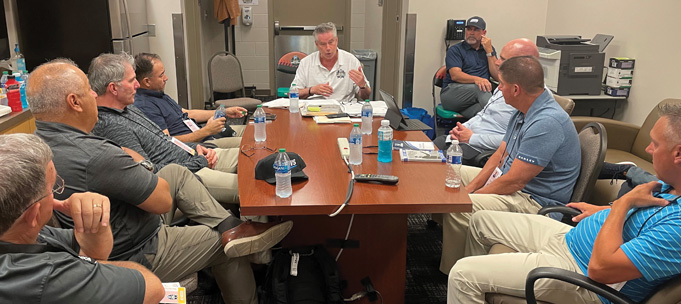
For good measure, what’s a few more people making their way through the umpires’ hallowed ground? Several NCAA administrators are also on hand, performing a variety of duties consistent with putting on the association’s largest championship event, occasionally interrupting Drouches to wish the umpires the best before the week gets real.
Over the course of the next 24 hours, Drouches will hold three different meetings with the entire crew to discuss matters such as game assignments and crew expectations. Bruns will lead a walkthrough around the perimeter of the playing field to discuss ground rules, pointing out tricky spots with the railing above the outfield fence and the myriad microphones that have been embedded every few steps on the warning track. Haze will go over scripts shared with Head and Van Raaphorst about proper verbiage for use during video reviews that will be communicated not just to the 24,000 fans in attendance, but the millions watching on their TVs, computers or smartphones.
Just another game? Seriously?
“It’s just to make sure that we do what we’re supposed to do as far as umpiring, enforcing rules, doing everything the way they want it in NCAA baseball,” said Head, working his fourth MCWS and his second as a crew chief, having also earned that title in 2017.
“My opinion is it’s just necessary, those first few days before the games start, just to make sure everybody is on the same page. Then, after that, once the games start, it’s just umpiring baseball.”
Memories Galore
Of course, “just umpiring baseball” isn’t the only thing the eight umpires will take away from Omaha once they depart on June 27. Sure, there will be that one pitch, that one play, that one ruling that sticks with each of them. You don’t reach the college baseball umpiring pinnacle without being able to employ some honest self-observation about the job you’ve done and creating expectations about how, even once you’ve reached this level, you can do it better.
But there’s no debating the memories of Omaha will be tinged more by what’s happened off the field than anything on it.
For some, like Cooper, it’s the realization of coming full circle after walking away from his professional umpiring career back in 2006, having reached the Triple-A level, in search of greater security for his wife, Monica, and his young son. Two years later, he got serious about college baseball. And another 15 years into his journey, after becoming one of the top umpires in the Southeastern Conference and with five Super Regional appearances to his credit, the phone call he had been dreaming about finally came.
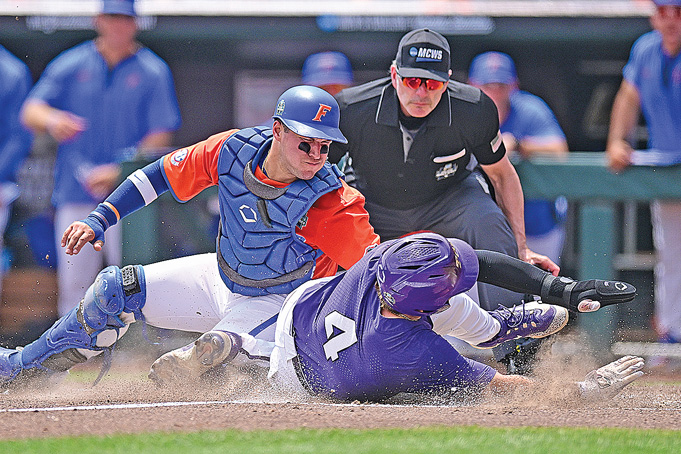
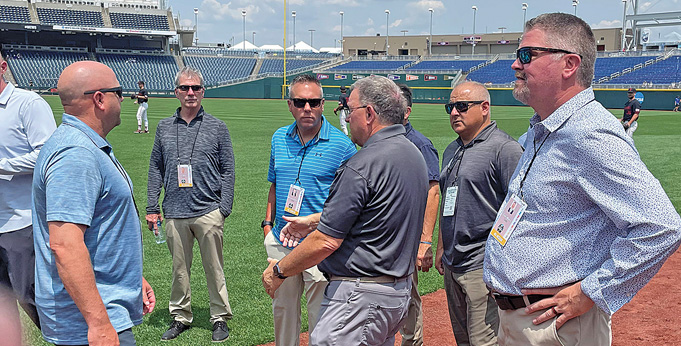
“I remember hanging up with (Drouches) and I started calling my wife, started calling my parents. I was crying driving down the road,” Cooper said. “It was special. It was a long and winding road to get there.”
When he stepped on the turf Friday afternoon for Game 1 to kick off this year’s event, the cheering section for the third-base umpire was every bit as strong as those for any player suited up for Oral Roberts or TCU.
“I had my wife here, my three sons, my mom, my dad, my brother. My dad had a quadruple bypass over Christmas. Just being here for Father’s Day weekend, that was special,” Cooper said.
It was no less special for Savage, the one member of this year’s MCWS crew who never worked a professional baseball game in his career. The consummate “grinder” umpired his first NCAA D-I baseball game back in 1994, and 16 years later had his “Brandon Cooper moment” when he made his Omaha debut in 2010 in what would be the final MCWS held at the venerable Johnny Rosenblatt Stadium.
Now, 13 years later, here he was again, the dean of the 2023 crew, making his fifth Omaha appearance after another strong season in the SEC.
“Everyone has goals as officials, and this is the ultimate goal,” Savage said. “It’s still an honor and I don’t take it for granted by any stretch of the imagination.”
Despite five trips in 13 seasons, he admitted the nerves remained present when he trotted out to work first base in the opening Friday night game between Florida and Virginia.
“It’s not easy. I wish there was some magic formula to figure out what to do,” he said. “You just come in here and try to relax.”
Then again, relaxation can be overrated. Making his second MCWS appearance after debuting in 2021, Armendariz, who worked 60-plus MLB games before transitioning to college baseball 16 years ago, compared the Omaha experience to the passion that accompanies international baseball on certain parts of the globe.
“I remember when I was working winter ball in the Dominican Republic … I’ve never been around an environment like that, in Winter League baseball,” said Armendariz, who works primarily in the Pac-12 Conference. “That big environment, it just pumps you up. It’s a rush to bring out the best in you.”
But like the after effects of a strong cup of coffee, the jolt eventually does fade, each umpire left standing to find the routine that will allow him to perform at his best for a two-week stretch and leave the type of impression that might allow him, if he’s fortunate, to experience it all over again at some point in the not-too-distant future.
“There are a lot of guys worthy of working out here. A lot of great umpires,” said Head, who had to wait six years to make it back. “You’ve done the math. You’ve seen how long it’s been.
“This means a lot to me. I had to overcome some obstacles to be given this opportunity and I really appreciate them giving me this opportunity to come back.”
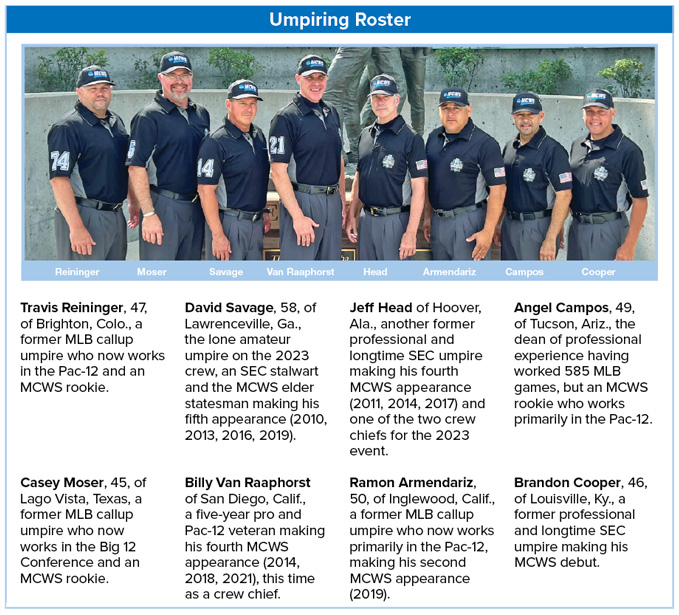
What's Your Call? Leave a Comment:
Note: This article is archival in nature. Rules, interpretations, mechanics, philosophies and other information may or may not be correct for the current year.
This article is the copyright of ©Referee Enterprises, Inc., and may not be republished in whole or in part online, in print or in any capacity without expressed written permission from Referee. The article is made available for educational use by individuals.

